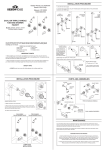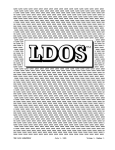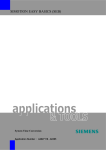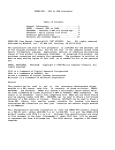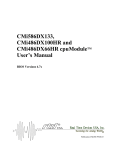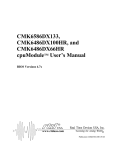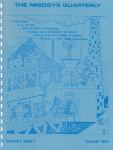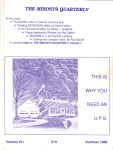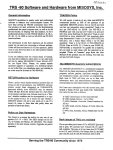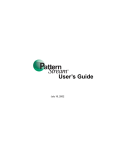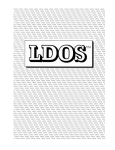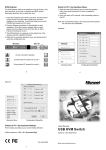Download Acrobat
Transcript
LDOS is a new generation of operating system for the TRS-80 computers. It is a totally device independent system, capable of device linking, routing, setting, and filtering. LDOS will support up to eight logical drives, including 5" and 8" floppies, single/double density, single/double sided, and up to 80 tracks, all available step rates are supported. Hard disks are supported. up to 13 Megabytes as a single drive. Hard drives may be partitioned to represent up to six logical drives, depending on the number of heads on the drive. True data transportability is now a reality - Model I/III LDOS disks can be either single or double density, and can be read or written on either machine. Model I LDOS supports double density with the Lobo LX-80 interface, or with the Percom Doubler II. A complete Supervisory Call table is available in LDOS 5.1. This will allow assembly programs to be transported directly between machines, on all Z-80 implementations of LDOS. LDOS is completely documented in an extensive operating manual (over 280 pages), containing both user instructions and a large section with technical information. Numerous examples are given to detail all operating functions. Full customer support is provided, and includes a toll-free customer support number, maintenance and enhancement updates, a MicroNET bulletin board for feedback and messages, a quarterly newsletter, and a full time support staff. To facilitate handling large numbers of files, all files created under LDOS carry their date of creation or last modification, and are marked with a "Mod" flag if modified since their last backup. Many LDOS commands and utilities can manipulate files by user specified file extension, full or partial file name (including the use of wildcard characters), by Mod flag, or by a date or range of dates. The LDOS operating system comes with an extensive Job Control Language. This is a compiled language that allows the user to input commands and Job Control conditionals and execution statements into a file which will control the computer's job stream. Execution can be tied to the setting of the real time clock, and can provide both visual and audio alerts. Variables and labels may be assigned by the user at run time to select the actual Job Control execution and starting position in the JCL file. LDOS comes complete with an RS-232 driver program, a terminal utility including disk file send and receive, 128 character keyboard Type Ahead, a disk modifying Debug utility, a program Patch utility, a KeyStroke Multiply program for key re-definition, full printer Spooling to memory and/or disk, a printer output formatting program, a feature to reside /SYS Files for super fast operation and much, much more. An extensive set of Library Commands provide much of the system's versatility. APPEND - Appends two files together, or a device to a file. Optionally, the first file may be backspaced one byte to allow an old end of text marker to be overwritten. CREATE - pre-allocates file space in 1 gran blocks. The file space is allocated in the most contiguous manner possible. This file space will never shrink, but will expand dynamically as needed. ATTRIB - Sets or alters a file's password and protection status. Also allows the disk's name, master password, and file protection to be changed. DATE - Sets or displays the current system date, which remains intact until power down. Any files created or updated will show this date as the date of last modification. AUTO - Causes a specified command line to be executed on power-up or reset. Automatic Break key disable may also be specified. DEBUG - Turns on the regular or extended debugger. Debug features include program single stepping, memory dump to a printer, disk read/write/modify, memory modify and input/output to specified ports. BOOT - Causes the disk in drive 0 to be booted into the system, effectively a software reset. BUILD - Create ASCII or packed Hex format files, or append to the end of existing files. CLOCK - Turns the real time clock display on or off. COPY - Copies from one file or device to another file or device. If copying files, dynamic defaults will be used for the filename, extension, and password. Copy also supports files with logical record lengths of other than 256, and allows the correct transfer of passwords, protection level, and visibility. Copy also provides for single drive copies between non-svstem disks. DEVICE - Displays all currently enabled disk drives, logical devices, and user selected options, along with I/O directions, routing, and I/O driver addresses. DIR - Displays disk drive directories. Display parameters include full or partial file name and/or extension (including wildcard characters), Mod date or range of dates. Invisible files, and System files. The display output may be selected to show file space and record allocation, logical record length, protection status, Modification date, Modification status, and may be sent to a line printer DO - The Do command allows the system to compile and execute a predefined series of commands and keystrokes stored in a disk file. A unique Job Control Language provides screen and audio alerts, conditionals, variables, logic, and user interaction during Do functions. PURGE -Provides for selective deletion of all files on a disk, regardless of password protection. All files may be acted on or files may be specified by full or partial filename and/or extension, Mod flag status, by date or range of dates, and by file type (Visible, Invisible, or System). DUMP - Dumps memory to a disk file in either load module format or as a pure image (ASCII) type file. A special End of Text marker may be specified for ASCII dumps. RENAME - Renames a disk file using dynamic defaults for filename and extension. FILTER - Allows all I/O to a specified device to be passed through a filtering routine. Several filter programs are provided with the LDOS system, and examples of creating filtering routines are fully documented in the technical section of the manual. RESET - Resets a specified device to its normal power up driver. If the device is non-standard, all I/O to it will be ignored. ROUTE - Routes I/O from one device to another, or from a device to a disk file. Route will also create new user specified logical devices. FREE - Displays the unallocated space and the number of free files for all enabled disk drives, or a free space map of an individual drive showing used, free, and locked out granules. Either display may be sent to a line printer. RUN - Loads a load module format file into memory and begins execution. An (X) parameter is provided to run programs from non-system disks in a single drive system. KILL - Deletes a specified file or device from the system. SET - Sets a new or existing logical device to a driver routine. LDOS provides a Keyboard and an RS-232 driver program. LIB - Displays the primary and secondary LDOS command libraries. LINK - Links together input and output to/from multiple logical I/O devices. This allows output to be sent to and input requests to be satisfied from multiple devices by linking these devices together. LIST - Displays a listing of a file. Parameters include line numbering and tab expansion for ASCII files, and record number and logical record length for hex formatted output. Listings may also be sent to the printer. LOAD - Loads a load module format file into memory without execution. An (X) parameter allows loading from non-system disks in a single drive system. MEMORY - Display and/or set memory protect address (HIGH$), allows direct modification of a memory address (either I or 2 bytes), allows a direct jump to a memory address, and provides a way to clear memory. SPOOL - Spools output to a device through memory and optionally through a disk buffer. Output will continue even if the computer is performing other jobs. SYSTEM - allows for changing the configuration of the LDOS system. Among the available features are Break key disable, Blinking cursor, Drive parameters (step rate, enable/disable, delay before read, software write protect), residing System modules, and selecting the system drive. These features, along with most other device routing, filtering, and setting can be sysgened to disk and will automatically configure the system on power-up or reset. TIME - Sets or displays the current time of the internal real time clock. TRACE - Displays the CPU's program counter on a real time basis. VERIFY - Causes read-after-write verification of all disk writes. LDOS provides a complete package of utility programs. BACKUP - Backup allows for the following commands: Backup only those files identified by full or partial filenames or extensions (including wildcard characters), Backup only those files that have been Modified, Backup files by date or a range of dates, Backup Visible, Invisible, or System files, Backup only those files that do/do not exist on the destination disk, and Backup between drives of different sizes and configurations. Backups between disks of different configurations will prompt for disk swaps if the destination disk becomes full. CMDFILE - A user oriented utility for handling system tapes and load module format disk files. CMDFILE allows for concatenation and load offset of tape and disk files, and will move files between disk and tape. CONV - A utility to move files from Model III TRSDOS (1.2 or 1.3) to an LDOS formatted diskette (requires two drives). FORMAT - Format allows for the following disk parameters to be specified: disk name and master password, single or double density, single or double sided, number of tracks, and the bootstrap step rate for system disks. Format will also format hard drives, and add system information to a hard drive that has been partitioned. LCOMM - An advanced communications package that allows machine-to-machine communications, supporting the keyboard, display, printer, and transmission and reception of disk files. LOG - Provides a way to log in a diskette configuration when using double sided disks in drive 0. REPAIR - Corrects certain information missing from Model I TRSDOS (2.3) diskettes. This makes these disks directly available for read/write operations using LDOS. PATCH - Patch allows the alteration of disk files, either by direct disk file modification, or by memory load address. Patches by memory may later be removed with the patch "Yank" feature. The following Device Driver programs add still more features: JL - This driver will enable the LDOS Joblog feature. The JobLog will send a list of all commands and error messages along with a time stamp to a specified file or device. Certain other information, such as filenames moved during a backup, will also be logged. KI - This driver will enable certain keyboard related features such as Type Ahead, Screen Print, high speed key repeat, and<CLEAR>key recognition used with other LDOS features. RS232 - An RS-232 driver which allows the operator to specify baud rate, word length, stop bits, parity, flags to set DTR and RTS, and checking of the DSR, CD, CTS, and RI signals (either TRUE or FALSE conditions). It can also detect simulated Break and Pause keys sent from a remote terminal. Several Filter programs are provided: KSM - A keyboard filter routine that allows the KeyStroke Multiply feature of LDOS to read in predefined files, assigning phrases or character strings to be used as keyboard input when the<CLEAR>and specified alphabetic key are pressed together. MINIDOS - A keyboard filter that provides constant access to certain LDOS commands such as Directory, Free space, Kill a file, and Debug. An immediate Top of Form function is also provided for use with line printers. PR - A filter for use with line printers. It provides for the setting of lines per page, physical page size, line width, line indent on wrap around, constant indent of the left margin, a one character translate feature, tab expansion, added linefeed, and a hard form feed during pagination. The following features will be found in Disk Basic (LBASIC): Upward compatible with Microsoft Basic. Blocked (variable length) files are supported. Single key commands to edit or list the current program line, to list the next or previous program line, or to list the first or last program line. LDOS commands may be executed from Basic Single character abbreviations for some commands. New file modes - files may be declared "Old" or "New" when opened. A single step feature allows program execution to be paused, and then single stepped statement by statement. Built in string array sort. High speed load and save. New statement - Set EOF - allows the user to adjust the End Of File marker for Random files, and reclaim disk space beyond the new EOF marker. Run multiple programs with common variables. Programs may also be Run starting at a specified line number. New statement - Restore nnnn - Restores the Data pointer to a specified line number. For additional information contact: (West) LOBO DRIVES 354 S. Fairview Ave., Goleta, CA 93117 805/683-1576 (Central) GALACTIC SOFTWARE 11520 N. Port Wash. Rd., Mequon, WI 53092 414/241-8030 (East) MISOSYS 5904 Edgehill Dr., Alexandria, VA 703/960-2998 LDOS is a product of Logical Systems, Inc., 11520 N. Port Wash. Rd.. Mequon, Wis. 53092 (414) 241-3066 Specifications are subject to change without notice. Logical Systems, Inc. has spared no effort or expense in developing LDOS or in setting up ongoing support for its dealers and users. Review these special support features and compare them to what other operating systems offer their dealers and customers. You will agree that LDOS is really in a class all by itself. 1> TOLL FREE 800 NUMBER for dealer and customer service, NOT an order line. This phone number is only published in the LDOS user's manual, so only existing customers and dealers will have it. 2> ONE YEAR of maintenance comes with each LDOS. The user may send in his original diskette with $5.00 as often as he wishes, and receive the latest version of LDOS. This service eliminates the need for the user to apply patches or enhancements himself, although he may do so if he wishes. 3> QUARTERLY NEWSLETTER for all registered LDOS users. A newsletter containing useful information from other LDOS users as well as technical information and editorial content, from our staff and distributors. 4> MICRONET BULLETIN BOARD service, sponsored by Logical Systems, Inc. and available for all LDOS users who are also MicroNET subscribers. The LDOS registration card contains a space for the customer to register his MicroNET user number with our customer service department. He will then be logged into our bulletin board as a valid user. The bulletin board will be maintained by our customer service personnel on a regular basis, to answer questions and provide timely information. 5> ONGOING SUPPORT will be provided to LDOS users. After each year of ownership each LDOS user will have the opportunity to extend his LDOS support and services for a nominal annual fee. This support includes access to all of the above services, including the quarterly newsletter. 6> COMPETITIVELY PRICED at a suggested retail of $169.00, which includes an extensive manual with a lengthy section dedicated to technical information. Contact your local dealer or the distributor nearest you for additional information or to order your copy of LDOS. Distributed by: LOBO DRIVES INT. 354 S Fairview Ave. Goleta, CA. 93117 805/683-1576 GALACTIC SOFTWARE 11520 N Port Washington Rd. Mequon, WI. 53092 414/241-8030 MISOSYS 5409 Edgehill Dr. Alexandria, VA. 22303 703/960-2998 LDOS is a product of Logical Systems, Inc. (Prices subject to change without notice) 11520 N. Port Washington Rd. Mequon, WI. 53092 (414) 241-3066






